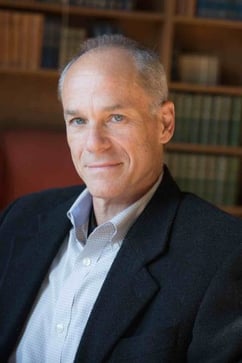Is atheism inconsistent with the scientific method? A prize winning physicist’s answer may surprise you.
 Marcelo Gleiser, 2019 Templeton Prize Winner / Gleiser CC
Marcelo Gleiser, 2019 Templeton Prize Winner / Gleiser CC
This year’s winner of the Templeton Prize is Marcelo Gleiser, theoretical physicist and cosmologist at Dartmouth College. The Templeton Prize is awarded each year to an individual who has made “an exceptional contribution to affirming life’s spiritual dimension, whether through insight, discovery, or practical works.” Past recipients include scientists such as John Polkinghorne and Freeman Dyson as well as religious and political leaders such as Mother Teresa, the Dalai Lama, and Desmond Tutu.
Gleiser’s research has led him to consider the properties of the early universe, the behavior of fundamental particles, and the origins of life. But in awarding him its most prestigious honor, the Templeton Foundation cited his role as a leading public intellectual revealing “the historical, philosophical and cultural links between science, the humanities and spirituality.”
Translated into 15 languages, Gleiser's books offer a distinct perspective on science, including its relation to religion and philosophy. The titles of the following award winning science books reveal a joy, and perhaps even a playfulness, in his attitude to his work in physics and astronomy: “The Simple Beauty of the Unexpected” (2016), “The Island of Knowledge” (2014), “A Tear at the Edge of Creation” (2010), “The Prophet and the Astronomer” (2002), and “The Dancing Universe”(1997/2005).
Science vs. Scientism
In an interview, Gleiser’s argues against those scientists, especially the New Atheists, who use science to support their atheism. His argument is quite simple: their position is anti-scientific. By making a categorical statement of their belief in disbelief, they are not relying on evidence. He explains it this way:
“It’s a declaration. But in science we don’t really do declarations. We say, ‘Okay, you can have a hypothesis, you have to have some evidence against or for that.’
Gleiser adds a further distinction in relation to man’s unique place in the universe. He considers himself a “rare Earth” kind of guy:
“The point is, to understand modern science within this framework is to put humanity back into a kind of moral center of the universe, in which we have the moral duty to preserve this planet and its life with everything that we’ve got, because we understand how rare this whole game is and that for all practical purposes we are alone.”
He adds:
“There is a difference between ‘science’ and what we can call ‘scientism,’ which is the notion that science can solve all problems. To a large extent, it is not science but rather how humanity has used science that has put us in our present difficulties. Because most people, in general, have no awareness of what science can and cannot do."
Gleiser illustrates the problem with an example. He explains that while it is an exciting prospect to develop a self-driving car, this comes with some difficult problems. “Hard choices” have to be made by drivers, sometimes instantaneously. For example do I prioritize my life over the life of innocent pedestrian bystanders?
Gleiser asks: who decides this for a self-driving car? Is it the google developer who makes that final determination? He is quick to point out that such decisions require input from ethicists and philosophers, because science and technology cannot give us all the answers.
The Island of Knowledge
In his book, “The Island of Knowledge,” Gleiser uses the following metaphor:
“Knowledge advances, yes? But it’s surrounded by this ocean of the unknown. The paradox of knowledge is that as it expands and the boundary between the known and the unknown changes, you inevitably start to ask questions that you couldn’t even ask before.”
In other words, he is leary of claims or attempts to develop a “theory of everything.” He believes it turns science into a religious system and is actually an unobtainable objective.
But shouldn’t we be looking for “ultimate” explanations?
Gleiser’s answer is yes, of course, but not to find “final answers.” He values the process of discovery: “It’s what you find along the way that matters, and it is curiosity that moves the human spirit forward.”
How curiosity grew from a childhood loss
Gleiser’s mother died when he was only 6 years old. This devastating loss made him very curious about time and existence, but it wasn’t until he “found” Einstein as a teenager that he turned to science to help him explore these fundamental questions. In an interview, he notes:
“That was when I realized, you can actually ask questions about the nature of time and space and nature itself using science. That just blew me away. And so I think it was a very early sense of loss that made me curious about existence. And if you are curious about existence, physics becomes a wonderful portal, because it brings you close to the nature of the fundamental questions: space, time, origins. And I’ve been happy ever since.”
Science as “an engagement with the mysterious” and the joy of discovery
Gleiser refers to the often quoted observation of Einstein on the mysterious as the source of human creativity:
“The mysterious is the fundamental emotion that is at the cradle of all creativity in the arts and the sciences.”
In this 8 minute video, Dr. Gleiser explains how the joy of discovery also has driven his work.
[embed]https://www.youtube.com/watch?v=yPigME8pHmA&feature=youtu.be[/embed]
Gleiser received the Templeton prize on May 29, the 100th anniversary of the Eddington expedition which confirmed Einstein’s theory of general relativity. In his acceptance speech, he noted the coincidence that the observations of the solar eclipse took place in Brazil and 100 years later a Brazilian (himself) is being honored with this prize. He remarked:
“There is something very special about this planet, and there is something very special about us, because we are the creatures that are able to understand—or try to understand—our origins. We are self-aware molecular machines capable of wonder and awe. And that, to me, is something that should be celebrated every day.”
Read Also:
What is Truth? The Dance of Science and Truth (Part 2)

